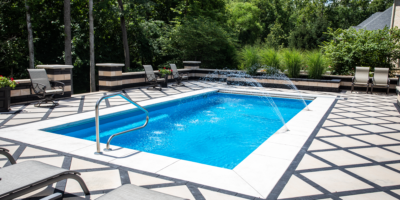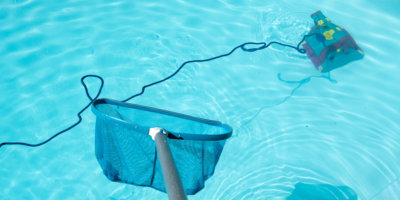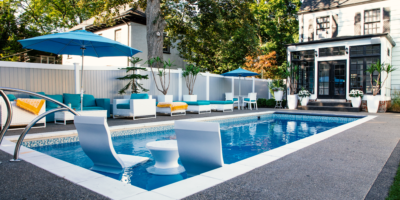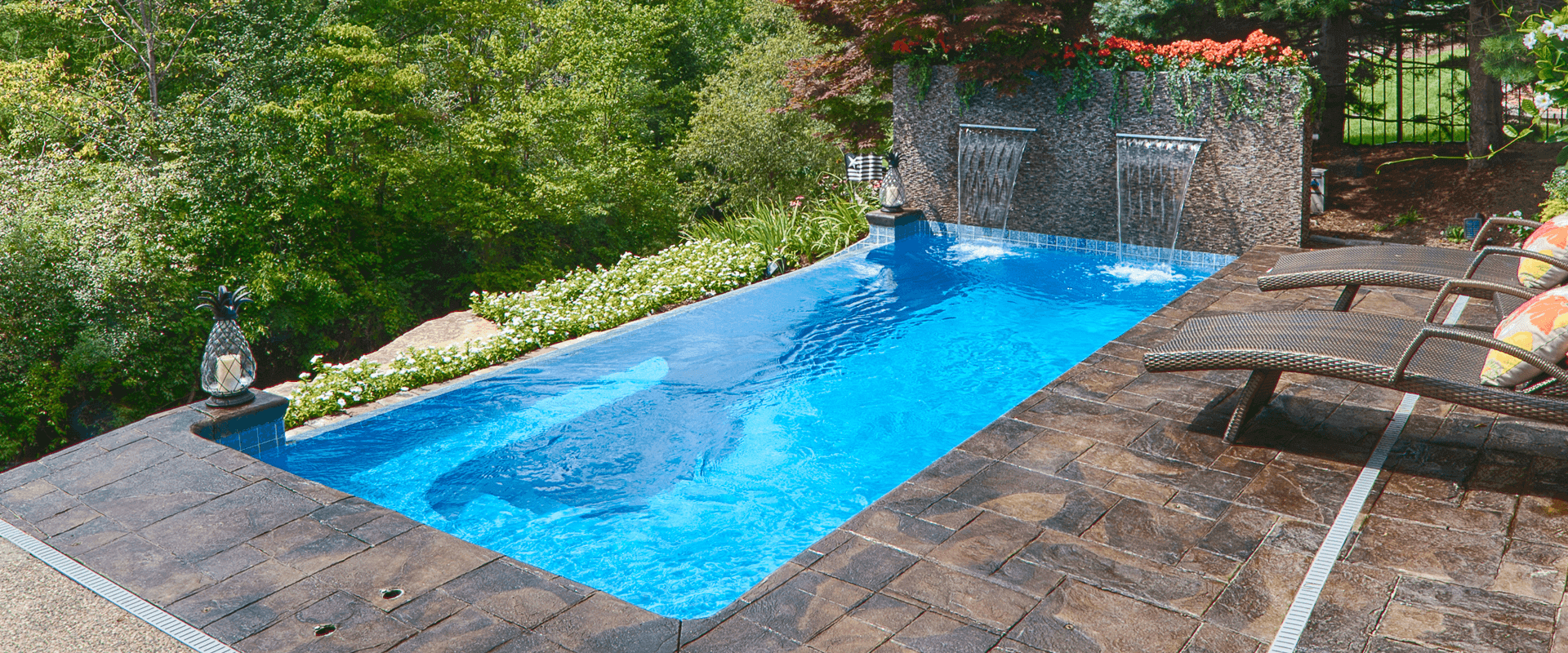877-929-7665
Are Fiberglass Pools Easier to Maintain?
A swimming pool can be a great addition to your home and life. An inground pool can increase your property value and home enjoyment, keep you cool in the hot weather, and provide a gentler way to exercise and be healthier. That said, when considering a pool purchase, homeowners often want to know how much time and money they will need to invest. And among the most common questions is, “Are fiberglass pools easier to maintain?” The truth is that all pool types have their advantages and disadvantages, and all require regular maintenance.

Fiberglass Pool Maintenance
Are Fiberglass Pools Easy to Maintain?
While they’re not maintenance-free, fiberglass pools are generally considered to be lower maintenance as far as inground pools go. Because fiberglass pools come in one piece, there are no seams where dirt and algae can collect. Their smooth surface is not porous, so it’s not likely to promote the growth of algae and bacteria. Other pool types may require resurfacing or liner replacements over time, whereas fiberglass can last a long time with regular upkeep.
What Maintenance Does a Fiberglass Pool Need?

Fiberglass pools are relatively easy and inexpensive to keep in good shape. Fiberglass pools generally do not need to be fully resurfaced after so many years. With some basic maintenance, your fiberglass pool’s gel coat can last for a long time.
Maintenance for fiberglass pools consists of three basic components: the filtration system, the pool’s water chemistry, and some basic manual cleaning tools.
Filtration – Your pool’s filtration system likely consists of a filter, skimmer basket, and strainer pot. You’ll need to empty and clean all of these at regular intervals.
Pool Water Chemistry – One of the most important regular maintenance tasks is to check your pool’s chemicals. Balanced water chemistry is important for avoiding corrosion, scaling, and staining, and for extending the life of your pool. Test strips are the least accurate way to test your water. A Taylor test kit is preferred or use a digital testing device to check your pool’s levels every so often. We recommend referring to your pool’s owner’s manual for water chemistry levels best suited for your fiberglass pool shell.
Cleaning Tools – As with any swimming pool, some basic cleaning tasks can keep your fiberglass pool free from dirt and debris. Skim, brush and vacuum the pool regularly to keep it clean. Use a skimmer net to catch leaves, grass, and other debris that land in your pool. Use a pool brush to gently clean any dirt that may collect on the bottom or sides of your pool. Be sure not to use any abrasive tools as they can damage the gel coat surface.

Pros and Cons of Fiberglass Pools
Fiberglass pools are among the most popular options available today, and for good reason. There are many benefits of fiberglass swimming pools. However, they’re not necessarily the right choice for everyone. Let’s look at some of the pros and cons of fiberglass pools and their alternatives.
Advantages of Fiberglass Pools
Durability – One of the top reasons people choose fiberglass is durability. Fiberglass is strong and flexible, making it especially resistant to damage. Fiberglass is so sturdy that it can withstand the elements for quite some time without resurfacing if properly maintained.
Maintenance – Fiberglass swimming pools are lower maintenance compared to other types of pools. This means lower maintenance costs and more time enjoying your pool.
Built-in Features – Depending on the design, fiberglass pool shells come with built-in features such as tanning ledges, swim-outs, wrap-around benches, and more, whereas these features are often extras with other pool types.
Smooth Surface – Fiberglass pools have a non-skid, smooth surface which is not only attractive and comfortable to the touch, but also doesn’t promote algae growth.
Quicker Installation – Because fiberglass pools are prefabricated, they can often be installed more quickly and easily than other inground pool options.
Disadvantages of Fiberglass Pools
Cost – Fiberglass pools are an investment. They’re typically not the cheapest option but can save you money on maintenance costs in the long run.
Limited Design Options – While you’ll have plenty of sizes and shapes to choose from, fiberglass pools can’t be customized because they are built from prefabricated molds.
Potential Installation Issues – When installing a fiberglass pool, you want to make sure you hire a professional company experienced with fiberglass swimming pools. If your pool isn’t installed and backfilled correctly, it can lead to damages and expensive repairs in the future.
 How Long Do Fiberglass Pools Last?
How Long Do Fiberglass Pools Last?
While fiberglass pools can involve more upfront costs to install, they also tend to last a very long time. With proper care and upkeep, a fiberglass pool can last many, many years.
How Long Does a Fiberglass Pool Gel Coat Last?
A fiberglass pool gel coat can last a long time without needing to be replaced. However, it’s worth noting that not all pools and gel coats are created equal. If your pool was improperly installed, or finished with an inferior gel coating, or not maintained per the manufacturers requirements it may deteriorate more quickly.
A Final Word
All pools require proper maintenance to maintain their original appearance. It is generally accepted that fiberglass pools require less maintenance time and expense than other pool types. If you are considering a fiberglass pool, check out some designs to see if the fiberglass lifestyle is for you.
